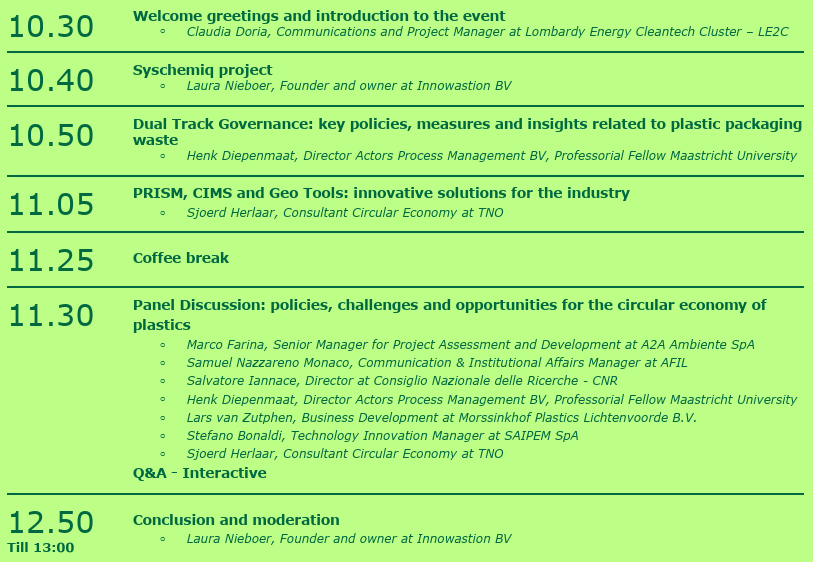LE2C has organized an interactive workshop dedicated to exploring innovative strategies, advanced policies and practical tools to transform plastic waste into valuable resources.
The event, organized by LE2C with support from the Brightlands Chemelot Campus - BCC, is part of the Dual Track Governance Workshops of the European Syschemiq project.
This online workshop brought together stakeholders from Italy and the Netherlands, involving companies, research centers, and associations in an open dialogue on solutions for plastic management and valorization.
The event was held online on March 12, 2025, from 10:30 a.m. to 1 p.m., entirely in English.
The event was an important opportunity to discuss innovative solutions and promote the exchange of knowledge and best practices on the circular economy of plastics, with a focus on:
- Measures related to plastic waste management;
- Challenges and opportunities, with a particular focus on decision-making models, materials, and innovative circular economy projects.
The event included an interactive Q&A session, offering participants the opportunity to engage directly with the speakers and delve deeper into the topics discussed.
Approaching the tools
During the event, advanced tools developed within Syschemiq, such as PRISM, CIMS and Geo Tool, was presented. These tools offer strategic perspectives and concrete results to address challenges related to plastics recycling and sustainability:
- PRISM (Plastic Recycling and Impact Scenario Model): A decision-making model that supports the identification of optimal strategies for processing different plastic waste streams, considering technical, economic and environmental variables. PRISM offers support to governments, companies and organizations in improving the efficiency and effectiveness of plastics recycling.
- CIMS (Chemelot Integrated Model System): A modeling system that guides strategies in chemical industry clusters, improving the economic, energy and environmental efficiency of industrial processes. CIMS helps companies and local authorities reduce carbon emissions, with the goal of achieving zero emissions by 2050.
- Geo Tool: A tool for geolocation of plastic flows, useful for planning, managing and evaluating policies related to plastics and plastic waste. It enables the analysis and prediction of flows in relation to socio-economic factors.


 Italiano
Italiano